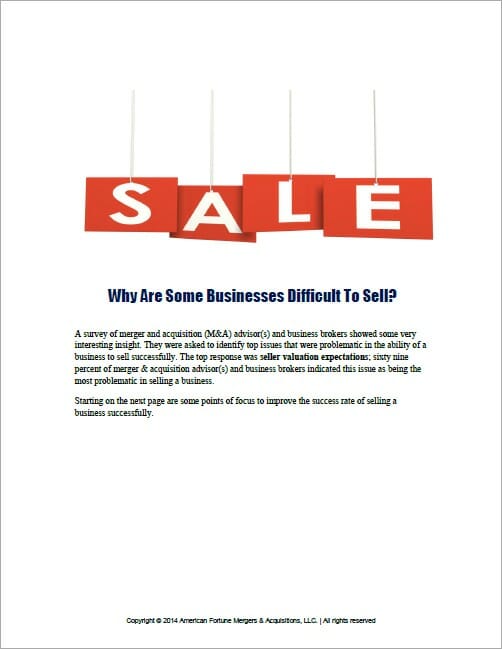Advice on Selling a Business by an Experienced Merger and Acquisition Consultant
This article provides advice selling a business. The typical business owner sells one business in his or her lifetime. On the contrary, corporate buyers often acquire multiple businesses each year, and financial buyers can be even more active. Invariably, inexperienced sellers can make mistakes that buyers can capitalize on.
Some of the most common mistakes when selling a business include the following:
Not knowing the value of the business – Private Business owners minimize profits to reduce taxes. Thus, their company’s financial statements often do not reflect the true profits and value of the business. As a result, many companies sold by their owners may be sold below market value.
Using a multiple or ratio to set price – There is no single multiple or ratio that applies to all privately held businesses and much depends on the industry type. Each business is unique and requires a comprehensive review and analysis of the company, as well as a strong understanding of the dynamics of the Mergers & Acquisitions marketplace, in order to determine a credible and defensible market value.
Selling a business at the wrong time – Many sellers wait too long to sell a business, not understanding that one should sell a business when the market is ready. Conversely, many business owners spend a lifetime building their businesses, only to sell their business hastily, failing to recoup the actual worth of their business.
Trying to rush the sale of a business – Once an owner has decided to sell a business, they understandably want the process to be over quickly. But preparation and selling a business including finding a qualified and willing buyer takes at a minimum of 6 to 24 months or even longer.
Negotiating with only one buyer – Although business owners may feel more in control when dealing with a single suitor, generating interest from multiple buyers can significantly increase the probability of selling a business at or close to the asking price.
Not understanding the buyer’s motives – Rather than emphasizing the business’ growth potential, sellers often dwell on the past performance. Buyers, however, are looking for future revenue projections, return on investment, growth potential, and synergy.
Inadequate documentation – Buyers expect documentation in the form of 3-5 years financials as well as documented procedures, policies and systems, including recast financial statements and five year pro formas, backed by solid research and analysis that shows the potential of the business into the future.
Assessing and negotiating offers – Businesses rarely sell for all cash at the closing with the balance being in a form of seller financing, earnouts or stock in the acquiring company. Instead, terms are often structured and can have complex tax and legal implications. Sellers should be able to assess and negotiate the terms of the transaction from every angle: personal, legal, and financial.
Trillions in liquidity are expected to be created over the next 10 years as aging Baby Boomers transition out of their closely held businesses to retirement. The three most common exit strategies are an outright sale of their business to a third party, recapitalization, or ESOP. The potential rewards of a successful business sale are great, but this complex and often time-consuming process should be expertly managed.
Speak with one of our Advisors to learn more about advice on selling a business.
By Brian S. Mazar, CBI, MBA
American Fortune







